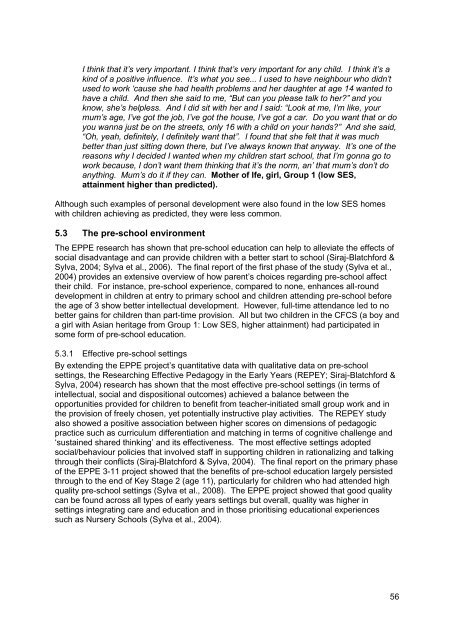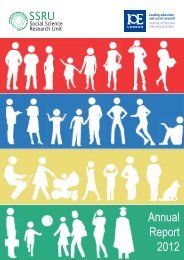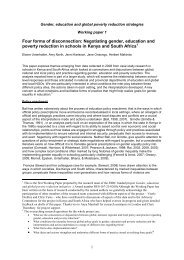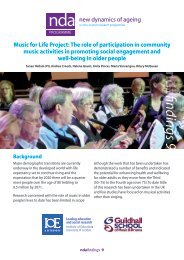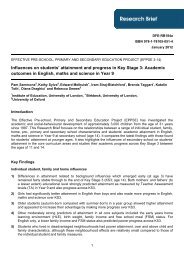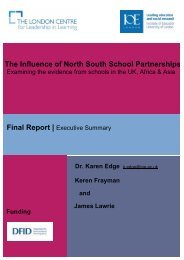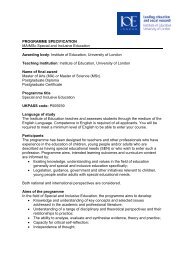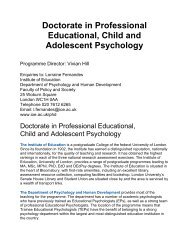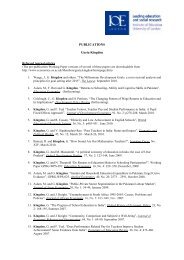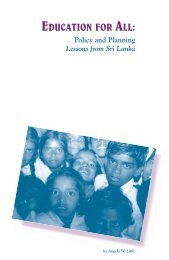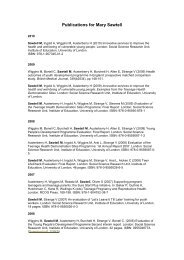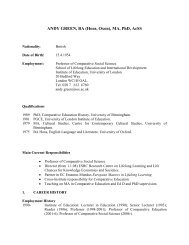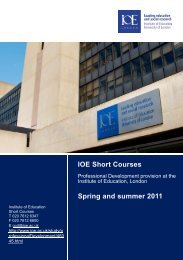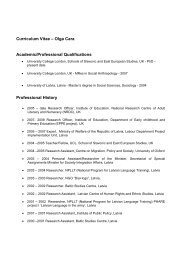Research report - Institute of Education, University of London
Research report - Institute of Education, University of London
Research report - Institute of Education, University of London
Create successful ePaper yourself
Turn your PDF publications into a flip-book with our unique Google optimized e-Paper software.
I think that it‟s very important. I think that‟s very important for any child. I think it‟s a<br />
kind <strong>of</strong> a positive influence. It‟s what you see... I used to have neighbour who didn‟t<br />
used to work „cause she had health problems and her daughter at age 14 wanted to<br />
have a child. And then she said to me, “But can you please talk to her?” and you<br />
know, she‟s helpless. And I did sit with her and I said: “Look at me, I‟m like, your<br />
mum‟s age, I‟ve got the job, I‟ve got the house, I‟ve got a car. Do you want that or do<br />
you wanna just be on the streets, only 16 with a child on your hands?” And she said,<br />
“Oh, yeah, definitely, I definitely want that”. I found that she felt that it was much<br />
better than just sitting down there, but I‟ve always known that anyway. It‟s one <strong>of</strong> the<br />
reasons why I decided I wanted when my children start school, that I‟m gonna go to<br />
work because, I don‟t want them thinking that it‟s the norm, an‟ that mum‟s don‟t do<br />
anything. Mum‟s do it if they can. Mother <strong>of</strong> Ife, girl, Group 1 (low SES,<br />
attainment higher than predicted).<br />
Although such examples <strong>of</strong> personal development were also found in the low SES homes<br />
with children achieving as predicted, they were less common.<br />
5.3 The pre-school environment<br />
The EPPE research has shown that pre-school education can help to alleviate the effects <strong>of</strong><br />
social disadvantage and can provide children with a better start to school (Siraj-Blatchford &<br />
Sylva, 2004; Sylva et al., 2006). The final <strong>report</strong> <strong>of</strong> the first phase <strong>of</strong> the study (Sylva et al.,<br />
2004) provides an extensive overview <strong>of</strong> how parent‟s choices regarding pre-school affect<br />
their child. For instance, pre-school experience, compared to none, enhances all-round<br />
development in children at entry to primary school and children attending pre-school before<br />
the age <strong>of</strong> 3 show better intellectual development. However, full-time attendance led to no<br />
better gains for children than part-time provision. All but two children in the CFCS (a boy and<br />
a girl with Asian heritage from Group 1: Low SES, higher attainment) had participated in<br />
some form <strong>of</strong> pre-school education.<br />
5.3.1 Effective pre-school settings<br />
By extending the EPPE project‟s quantitative data with qualitative data on pre-school<br />
settings, the <strong>Research</strong>ing Effective Pedagogy in the Early Years (REPEY; Siraj-Blatchford &<br />
Sylva, 2004) research has shown that the most effective pre-school settings (in terms <strong>of</strong><br />
intellectual, social and dispositional outcomes) achieved a balance between the<br />
opportunities provided for children to benefit from teacher-initiated small group work and in<br />
the provision <strong>of</strong> freely chosen, yet potentially instructive play activities. The REPEY study<br />
also showed a positive association between higher scores on dimensions <strong>of</strong> pedagogic<br />
practice such as curriculum differentiation and matching in terms <strong>of</strong> cognitive challenge and<br />
„sustained shared thinking‟ and its effectiveness. The most effective settings adopted<br />
social/behaviour policies that involved staff in supporting children in rationalizing and talking<br />
through their conflicts (Siraj-Blatchford & Sylva, 2004). The final <strong>report</strong> on the primary phase<br />
<strong>of</strong> the EPPE 3-11 project showed that the benefits <strong>of</strong> pre-school education largely persisted<br />
through to the end <strong>of</strong> Key Stage 2 (age 11), particularly for children who had attended high<br />
quality pre-school settings (Sylva et al., 2008). The EPPE project showed that good quality<br />
can be found across all types <strong>of</strong> early years settings but overall, quality was higher in<br />
settings integrating care and education and in those prioritising educational experiences<br />
such as Nursery Schools (Sylva et al., 2004).<br />
56


